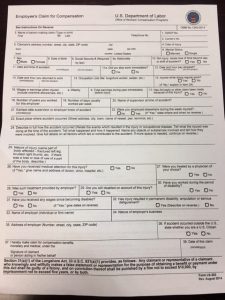By Deborah Caputo — Attorneys Jo Ann Hoffman & Associates, P.A.
You sustained injuries while working with a Defense Base Act contractor. As a result, you filed a Defense Base Act claim for benefits for your injuries. The abbreviation that will be referenced throughout this article which is “DBA” for Defense Base Act.
Your case progresses, litigation proceeds, accompanied by the scheduling of several events. Among these, one particular event, that is arranged by the attorney representing the Employer and their Insurance Carrier, is the Vocational Evaluation. This article dives into the details of vocational evaluations and mastering your approach with confidence.
What is a Vocational Evaluation?
Glad you asked.
An injury while working for a DBA contractor not only raises medical and disability concerns (which warrant separate blog discussions) but also impacts one’s ability to earn wages. The question a vocational evaluator in its simplest form is to address whether the injured person can earn the same wages they did at the time of their injury or in another employment.
During a vocational evaluation, you, your attorney, and the vocational evaluator meet. Think of your attorney as your filter, ensuring only relevant questions are asked. The evaluator, hired by the Employer and Insurance Carrier, seeks information. The evaluation aims to establish the wage someone with your injuries would earn in the open job market under normal circumstances, and after the evaluation, the evaluator will provide a document titled, the “Labor Market Survey”.
The Labor Market Survey is essentially a list of potential jobs with each respective job detailing its responsibilities and average salary. The Labor Market Survey will be sent to all parties in the case post-evaluation.
So, this Labor Market Survey is just based on my evaluation, is that it?  Continue reading →
Continue reading →
 Florida Injury Attorneys Blog
Florida Injury Attorneys Blog






 Our goal: We seek to get your treatment. The treatment can include medication, psychological care, and settlement funds to return you to gainful employment. We apply for benefits for you through filing an
Our goal: We seek to get your treatment. The treatment can include medication, psychological care, and settlement funds to return you to gainful employment. We apply for benefits for you through filing an 
 Did you know that there exists time period in which you must file your Defense Base Act claim in order to be eligible for compensation checks? Have you been told by an adjuster from one of the infamous insurance companies like Gallagher Bassett or AIG that your “statute has run”? In reality, your statute may not have expired at all! As an initial matter, there exists no time limit for medical treatment. This means that even if you had your injury 20 years ago, you are still eligible to file a claim for medical treatment! Medical treatment is never time barred (unless you settle your claim for a lump sum of money, then your medical claim usually closes forever).
Did you know that there exists time period in which you must file your Defense Base Act claim in order to be eligible for compensation checks? Have you been told by an adjuster from one of the infamous insurance companies like Gallagher Bassett or AIG that your “statute has run”? In reality, your statute may not have expired at all! As an initial matter, there exists no time limit for medical treatment. This means that even if you had your injury 20 years ago, you are still eligible to file a claim for medical treatment! Medical treatment is never time barred (unless you settle your claim for a lump sum of money, then your medical claim usually closes forever). while working overseas for a U.S. contractor/company and which can also provide you with compensation for medical treatment. The first step in filing a Defense Base Act claim is to seek and have proof of medical treatment for any work-related injuries you may have suffered on the job. The injuries you suffered can be physical or mental health injuries or both. Generally, there is a one-year filing deadline to make a claim for benefits after the work-related injury occurred. Filing a DBA claim for PTSD can be more complicated because the symptoms may not arise until after the 1-year deadline has passed. However, PTSD is generally considered an occupational disease which can extend the filing deadline to two-years after knowing of the injury. Here is the form you can use to file your DBA claim. It is called an
while working overseas for a U.S. contractor/company and which can also provide you with compensation for medical treatment. The first step in filing a Defense Base Act claim is to seek and have proof of medical treatment for any work-related injuries you may have suffered on the job. The injuries you suffered can be physical or mental health injuries or both. Generally, there is a one-year filing deadline to make a claim for benefits after the work-related injury occurred. Filing a DBA claim for PTSD can be more complicated because the symptoms may not arise until after the 1-year deadline has passed. However, PTSD is generally considered an occupational disease which can extend the filing deadline to two-years after knowing of the injury. Here is the form you can use to file your DBA claim. It is called an 

 Report your accident and injuries immediately to your supervisor. Your report should be in writing and should detail ALL body parts injured in the accident. Send an email with a bcc to yourself.
Report your accident and injuries immediately to your supervisor. Your report should be in writing and should detail ALL body parts injured in the accident. Send an email with a bcc to yourself.